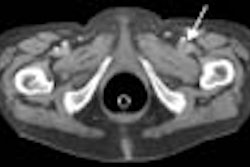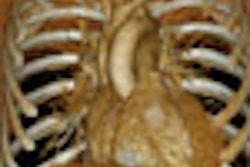Dear AuntMinnie Insider,
Seesawing sensitivities for polyp detection in recent trials have puzzled and inspired researchers on both sides of the Atlantic. Why does virtual colonoscopy beat optical colonoscopy in one trial, only to lag behind it in the next?
Many of the reasons are well known, of course. A myriad of factors such as slice thickness, reconstruction intervals, colonic distension, tagging, and radiologist training have been shown to affect accuracy in important ways, although the contribution of each factor is harder to pin down. The task at hand is to find the best mix of elements that will optimize accuracy, while keeping the exam attractive to patients.
There is broad consensus that advancing CT and workstation technology will continue to improve the results over time, and that reimbursement for colorectal cancer screening in the U.S. is only a matter of time. Leading researchers have been encouraged by strong patient demand for the noninvasive colorectal cancer test VC provides. And we will continue to drop in on them to learn from their experiences.
In this issue, for example, we feature a talk on the state of virtual colonoscopy by Dr. Andrik Aschoff, from the University of Ulm in Germany. Aschoff, who has seen his own results improve with advancing technology, wields a brand-new 40-slice scanner these days. He shares his protocols, and considerable insight, in our Insider Exclusive, made available to Insider subscribers first.
In today's Virtual Colonoscopy Digital Community you'll find another presentation from the recent 2005 European Congress of Radiology. Dr. Adrian Spreng from Bern, Switzerland, parses the extracolonic findings in two groups of VC patients -- one that received IV contrast before the exam, and one that did not.
This issue also features two recent studies from St. Mark's Hospital in London. The first, a meta-analysis, emphasizes the value of CT colonography in detecting extracolonic abnormalities. Another discusses the still-nebulous effects of training on reader performance. And from Dr. Perry Pickhardt and colleagues in Wisconsin, a very diminutive study on virtual colonoscopy in mice.




















